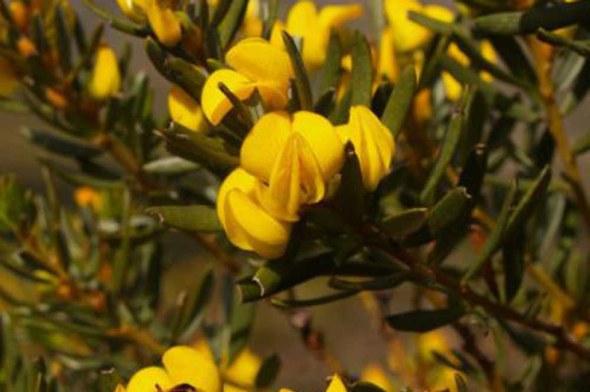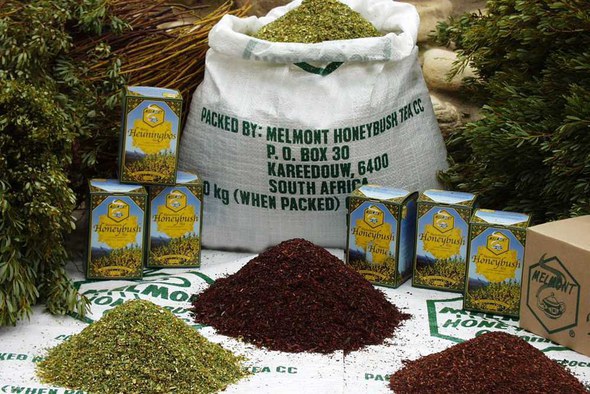Honeybush is a medicinal plant from South Africa, mainly thriving in the Fynbos region. Its tea is known for its honey-like aroma and has been traditionally used by the Khoisan for its health benefits.

Traditional Uses of Honeybush
The Khoisan, one of Africa's oldest indigenous peoples, who traditionally lived in the western and southern Cape region of South Africa, traditionally used Honeybush as a versatile natural remedy. The natural Honeybush tea was used to alleviate respiratory issues, digestive problems, and colds.The natural Honeybush tea was used to ease respiratory issues, digestive problems, and colds. Its mild, slightly sweet taste and soothing effect made Honeybush a popular drink, known for being gentle and stomach-friendly.
Honeybush proved especially effective for coughs and other cold symptoms due to its natural antioxidants and anti-inflammatory compounds that soothe the airways. These traditional uses highlight the cultural importance of Honeybush in South Africa’s healing plant heritage.

Botanical Characteristics of Honeybush
Honeybush belongs to the legume family (Fabaceae) and grows in the mountainous regions of South Africa. The plant has fine, needle-like leaves grouped in small clusters with a soft, distinctive texture. Its bright yellow flowers release a honey-like fragrance, giving Honeybush its name.
Honeybush thrives in the Fynbos region, an area with sandy, nutrient-poor soil and a Mediterranean climate. Its ability to survive in these harsh conditions comes from its high content of natural antioxidants, protecting it from intense sunlight and challenging environmental conditions. These antioxidant properties make it valuable as a beneficial tea for the human body.

The Health Benefits of Honeybush
Honeybush is known for its health-promoting properties and contains numerous polyphenols and natural antioxidants that protect cells from oxidative stress. Studies show that drinking caffeine-free Honeybush tea can have anti-inflammatory effects and strengthen the immune system.
With its natural minerals like calcium, magnesium, and zinc, Honeybush also supports bone health and helps regulate blood sugar. Honeybush is especially beneficial as an evening drink since it does not interfere with sleep and is gentle on digestion. Some studies even suggest that Honeybush can stabilize blood sugar levels and reduce the risk of metabolic disorders.

Discover Your Own Flavor Compositions
With Honeybush as a base, you can create your own world of flavors that suit your taste. Combine it with other South African healing plants like Rooibos, Buchu, or Cancerbush, or mix it with herbs like mint or lemongrass for fresh notes or warming spices like cinnamon and ginger.
Fans of fruity teas can add dried berries or orange peels for a sweet, refreshing touch. Floral notes like lavender or hibiscus also blend wonderfully with the natural Honeybush, creating a gentle aromatic experience. Every cup of Honeybush becomes a unique moment of pleasure.

Commercial Use and Industrial Processing
The Honeybush tea in our shop comes directly from the Nooitgedacht Farm, owned by the Nortje family, who pioneered the commercial use of Honeybush tea cultivation. In collaboration with Stellenbosch University, the farm has launched extensive research projects to optimize cultivation and processing, focusing on sustainable, organic practices. The Nortje family has played a significant role in developing the Honeybush industry, ensuring the conservation of this unique plant in the Fynbos region through responsible resource management.
Discover the fascinating history of Honeybush tea: how the passion of Honeybush pioneer Dr. Hannes de Lange from the Kirstenbosch National Botanical Garden in Cape Town transformed a local South African healing plant into a globally loved natural product. Learn more in the PDF “Honeybush Tea – A Uniquely South African Story” by Dr. Brigitte du Preez and Dr. Marina Joubert, Stellenbosch University, 2021.

Scientific Findings and Potential
In recent years, science has shown growing interest in the many benefits of Honeybush. Numerous studies explore the polyphenols and antioxidants in Honeybush, their anti-inflammatory effects, and potential immune system support.
Research also looks at Honeybush’s stabilizing effects on blood sugar and its potential benefits for preventing metabolic diseases. Another interesting area is its positive effect on the skin, which is why Honeybush extracts are increasingly found in skincare products. These findings underline Honeybush’s potential as a sustainable and valuable healing plant with benefits for health and the environment that are yet to be fully discovered.




